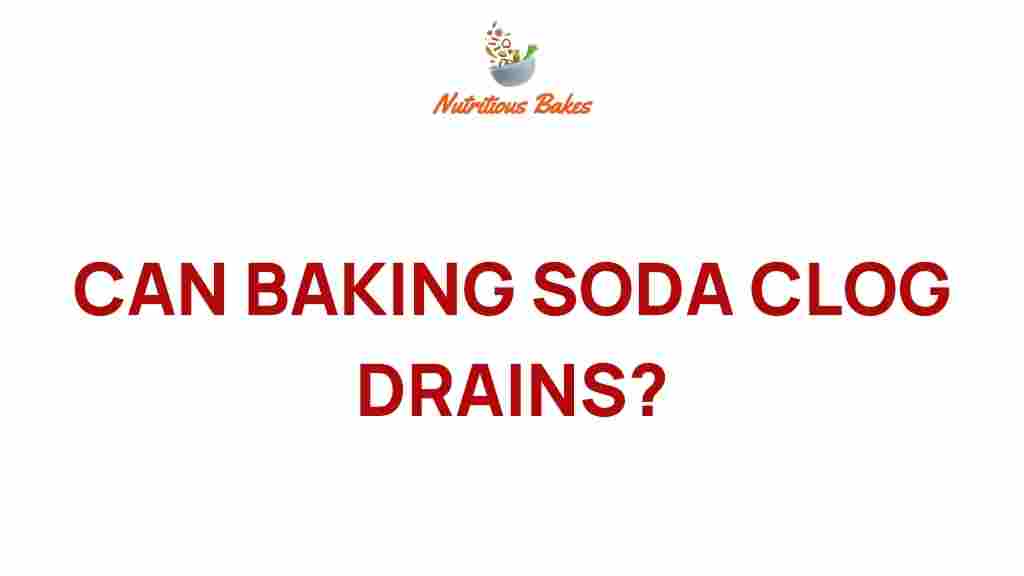The Hidden Dangers of Baking Soda: Can It Really Clog Drains?
Baking soda is a common household item, often hailed for its versatility in cooking, cleaning, and even deodorizing. However, many people are unaware of the potential dangers that can arise from its use, particularly when it comes to plumbing. While baking soda is often recommended as a DIY remedy for drain clogs, it can lead to plumbing issues if misused. In this article, we’ll explore the hidden dangers of baking soda, how it can affect your drains, and offer some essential plumbing tips for maintaining your home. Let’s dive into the world of baking soda and drain clogs.
Understanding Baking Soda and Its Uses
Baking soda, or sodium bicarbonate, is an alkaline compound that can react with acids to produce carbon dioxide gas. This reaction is what makes it effective in baking, as it helps dough rise. However, its chemical properties also mean that it can interact with other substances in unexpected ways, especially in plumbing systems. Here are some common uses of baking soda:
- Cooking: As a leavening agent.
- Cleaning: A gentle abrasive for scrubbing surfaces.
- Deodorizing: Neutralizes odors in the refrigerator and other areas.
- Drain Cleaning: Often combined with vinegar to unclog drains.
The Myth of Baking Soda as a Drain Cleaner
Many DIY enthusiasts swear by baking soda as a natural drain cleaner. The typical method involves pouring baking soda followed by vinegar down the drain, creating a foaming reaction that is believed to clear clogs. However, while this method can sometimes work for minor clogs, it is not a guaranteed solution and can sometimes exacerbate plumbing issues. Here’s why:
- Insufficient Reaction: The reaction between baking soda and vinegar can be insufficient to break down tougher clogs.
- Potential for Residue: Baking soda can leave residue in pipes, which may contribute to future clogs.
- Combining with Other Chemicals: If other cleaning agents have been used, the reaction with baking soda can be unpredictable.
How Baking Soda Can Clog Drains
While baking soda itself does not directly clog drains, improper use can lead to plumbing issues. Here’s how:
- Mixing with Vinegar: If not rinsed properly, the residue can harden and contribute to clogs.
- Accumulation: Regular use without thorough flushing can lead to buildup within pipes.
- Chemical Reactions: Baking soda can react with other substances in the drain, leading to unexpected blockages.
Step-by-Step Process for Safe Drain Cleaning
If you’re looking to unclog your drains safely without causing plumbing issues, follow these steps:
1. Assess the Clog
Before using any DIY cleaning method, assess the severity of the clog. Minor clogs may be resolved with household remedies, while severe clogs may require professional plumbing services.
2. Try Hot Water First
Start with pouring hot water down the drain. This can help dissolve grease or soap buildup without the need for any chemicals.
3. Use Baking Soda Wisely
If hot water alone doesn’t clear the clog, you can use baking soda as follows:
- Measure about half a cup of baking soda.
- Pour the baking soda directly into the drain.
- Follow it with a cup of hot water to help dissolve the baking soda and any debris.
4. Rinse Thoroughly
After about 30 minutes, flush the drain with more hot water. This step is crucial to ensure that no residue remains in the pipes.
Troubleshooting Common Plumbing Issues
If you encounter persistent clogs or plumbing issues even after using baking soda, consider the following troubleshooting tips:
1. Identify the Source
Understanding where the clog is coming from can help you address it effectively. Common sources include:
- Kitchen Sinks: Grease and food particles.
- Bathroom Drains: Hair and soap buildup.
- Shower Drains: Mineral buildup from hard water.
2. Use Alternative Household Remedies
If baking soda isn’t working, try these alternatives:
- Salt and Vinegar: A mixture that can help break down clogs.
- Boiling Water: A simple yet effective way to clear minor clogs.
- Plunger: A physical method to dislodge clogs.
3. Consider Professional Help
If the clog persists despite your efforts, it may be time to contact a professional plumber. Continuous issues can indicate larger plumbing problems that require expert intervention.
Essential Plumbing Tips for Home Maintenance
Maintaining your plumbing system is crucial to preventing drain clogs and other plumbing issues. Here are some essential plumbing tips:
- Regular Cleaning: Schedule routine cleaning of your drains using hot water and vinegar.
- Avoid Chemical Cleaners: They can damage your pipes and lead to more significant problems.
- Install Drain Covers: These can catch debris and prevent clogs before they start.
- Educate Family Members: Ensure everyone knows what can and cannot go down the drain.
DIY Cleaning: Effective and Safe Methods
While baking soda can be part of your DIY cleaning arsenal, it’s essential to use it wisely. Here are some effective and safe cleaning methods to consider:
- Vinegar and Baking Soda: Use in moderation and ensure proper flushing.
- Essential Oils: Consider using tea tree oil for its antibacterial properties.
- Castile Soap: A natural cleaner that can help maintain drain cleanliness.
Conclusion
Baking soda is a useful household remedy, but it’s crucial to understand its limitations and potential dangers when it comes to plumbing. While it can help with minor clogs, improper use can lead to drain clogs and plumbing issues. Always assess the situation, use baking soda wisely, and consider alternative methods for maintaining your drains. For persistent problems, don’t hesitate to reach out to a professional plumber. By following these plumbing tips and DIY cleaning methods, you can ensure a well-maintained home and avoid costly plumbing repairs.
For more plumbing tips and household remedies, check out this resource.
Remember, maintaining your plumbing system is key to avoiding unpleasant surprises in your home. Stay informed and proactive about your home maintenance!
This article is in the category Tips and created by NutritiousBakes Team
